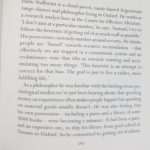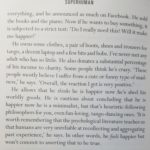Source: Rowan Hooper, Superhuman: Life at the Extremes of Mental and Physical Ability, London: Little, Brown, 2018, pp. 293-294.
Pablo Stafforini is a chisel-jawed, tousle-haired Argentinian tango-dancer and philosopher living in Oxford. He works as a research analyst here at the Centre for Effective Altruism. ‘I don’t aim at a particular number,’ he says. ‘Instead, I try to follow the heuristic of getting rid of as much stuff as possible.’ His possessions currently number around seventy. He thinks people are ‘biased’ towards resource accumulation—that effectively we are trapped in a consumerist system and an evolutionary state that tilts us towards wanting and accumulating too many things: ‘This heuristic is an attempt to correct for that bias. The goal is just to live a richer, more fulfilling life.’
As a philosopher he was familiar with the findings from psychological studies we’ve just been hearing about: that spending money on experiences often makes people happier but spending on material goods usually doesn’t. He was also finding that his own possessions—including a piano and a library of some 3000 books—were becoming a nuisance. It had been a pain, and an expensive one, to ship his library from grad school in Toronto to Oxford. So he committed to getting rid of almost everything, and he announced as much on Facebook. He sold the books and the piano. Now if he wants to buy something, it is subjected to a strict test: ‘Do I really need this? Will it make me happier?’
He owns some clothes, a pair of boots, shoes and trousers for tango, a decent laptop and a few bits and bobs. I’ve never met any adult who has so little. He also donates a substantial percentage of his income to charity. Some people think he’s crazy. ‘These people mostly believe I suffer from a cute or funny type of madness,’ he says. ‘overall, the reaction I get is very positive’.
He allows that he thinks he is happier now he’s shed his worldly goods. He is cautious about concluding that he is happier now he is a minimalist, but that’s heuristic-following philosophers for you, even fun-loving, tango-dancing ones. ‘It is worth remembering that the psychological literature teaches us that humans are very unreliable at recollecting and aggregating past experience, he says. In other words, he feels happier but won’t commit to asserting that to be true.



